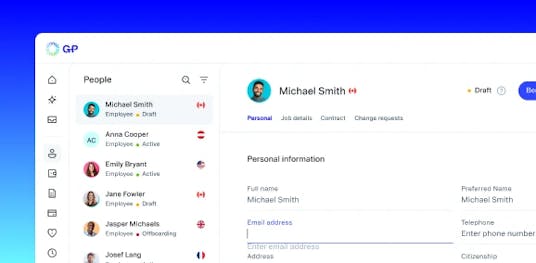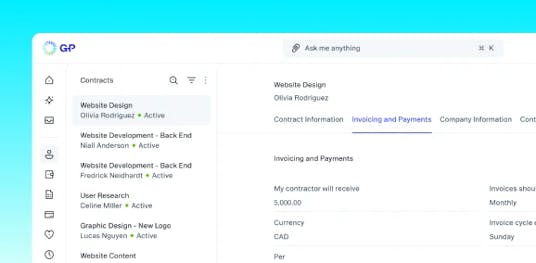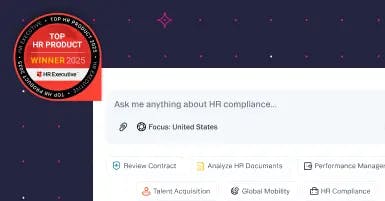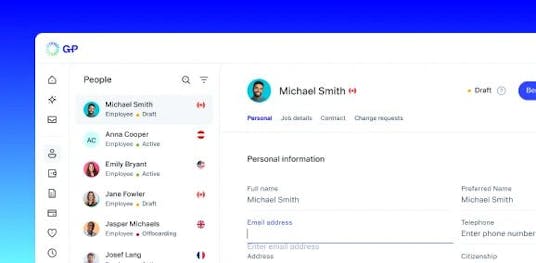Guide to hiring in Luxembourg
Located in central Europe, Luxembourg borders major economies like Germany, France, and Belgium. The country offers excellent trade and commercial access to the EU market.
Luxembourg’s extensive network of double taxation treaties reduces tax burdens for global businesses. Luxembourg may fall under the radar, but it could be the strategic edge you need. Our guide will tell you everything you need to know about hiring in Luxembourg.
What to know before hiring in Luxembourg

If you’re expanding your business into Luxembourg for the first time, there are important legal requirements to be aware of. These norms and laws influence hiring practices in Luxembourg and many aspects of the employer-employee relationship.
If you’re unsure where to begin, G-P Gia™,our AI-powered global HR agent, can answer your toughest compliance questions across 50 countries and all 50 U.S. states. Reduce your reliance on outside counsel and cut the time and cost of compliance by up to 95% with Gia.
Let’s take a look at five things to know about hiring in Luxembourg.
1. The Luxembourg workforce
Despite its small size, Luxembourg is a diverse country — 47% of Luxembourg's workforce are cross-border workers. Cross-border workers commute to work from neighboring countries like France, Belgium, and Germany. Another 25% of the workforce in Luxembourg are non-nationals.
The workforce in Luxembourg is also impressively skilled, specifically in multilinguism and sectors like supply chain logistics, engineering, and finance. According to the ManPower Group’s 2024 Total Workforce Index, 69% of workers are highly educated and 58% are fluent in English. Some of the country’s most significant business sectors include:
-
Advanced manufacturing
-
Clean technologies
-
Data economy
-
Fintech and finance
-
Health technologies
-
Logistics and supply chain management
-
Maritime
-
Smart mobility
-
Space
Other important industries include steel, agriculture, and tourism.
2. Language diversity
According to the Ministry of National Education, 98% of the population speaks French, 80% speaks English, 78% speaks German, and 77% speaks Luxembourgish. French and German are administrative languages alongside Luxembourgish. Other common languages in the country include Portuguese and some Slavic and Nordic languages.
The Luxembourg government notes that in the workforce, the language you can expect to hear depends on the context. French is most common, especially in the trade and the hospitality industries, followed by Luxembourgish, German, English, and Portuguese. English has become a dominant business language since it functions as a lingua franca — a common language between individuals who don’t share the same first language. English is most common in the banking and industrial sectors, as well as in European institutions in the country.
If your company uses a different language, you may need an expert to translate your incorporation deed — including the articles of association — to one of Luxembourg’s administrative languages.
3. Taxes and social security
Luxembourg is known for its favorable tax environment and business-friendly reputation. However, calculating employees’ taxes isn’t always simple.
Employers are responsible for withholding employees’ taxes and social security contributions. But a high percentage of workers are citizens of other countries, which adds to the complexity.
Luxembourg residents pay income tax and social security. Tax rates are progressive and take into account an employee’s income bracket, marital status, and dependents. When it comes to mandatory social contributions, both parties contribute to health and pension insurance. Employees alone pay into long-term care insurance. Employers cover contributions to accident insurance, occupational health services, and employer’s mutual insurance, which provides partial refunds for remuneration paid to absent employees.
Cross-border workers pay income tax for any income they earn in Luxembourg. This doesn’t include income earned elsewhere. If someone lives and works in Luxembourg for 183 days in a calendar year, they’re considered a resident and will be taxed on their worldwide income.
As for social security, frontier employees pay into the Luxembourg system unless they’re seconded by a parent company in a neighboring country and have been working in Luxembourg for less than two years. In this case, they can choose to pay into either country’s social security scheme.
4. Compensation
Luxembourg’s national currency is the euro. As of 2025, Luxembourg has the highest minimum wage in the EU. The country has four tiers for minimum wage, depending on the worker’s age:
-
18+ (skilled): EUR 18.29
-
18+ (unskilled): EUR 14.24
-
17 years old: EUR 12.19
-
15-16 years old: EUR 11.43
In addition to their salary, many employees receive a 13th-month bonus in Luxembourg. This bonus is equal to one month’s wages, and employers customarily pay it close to the Christmas holiday. Some employers give employees the equivalent of an extra 1.5 months of wages.
Collective Bargaining Agreements (CBAs) are common in Luxembourg. These agreements may set a higher minimum wage requirement for certain workers and impact other relevant terms, such as time off policies.
5. The workweek and time off
The workweek in Luxembourg is 40 hours, divided into five, eight-hour days. Employees may work overtime in some cases, which typically comes with an increased pay rate. However, Luxembourg employment law stipulates that pregnant employees should not work overtime.
Employees are entitled to 25 days of paid leave per year. Employees can request time off after they’ve been with a company for three months. In addition to annual leave entitlements, Luxembourg has 11 public holidays throughout the year.
You can easily administer benefits plans with G-P EOR. Our in-house experts continuously monitor employment laws to meet country-specific regulations and norms. Build and manage benefits plans through our platform to provide a smooth employee experience.
Top hiring hubs in Luxembourg
Some Luxembourgish cities are known for particular industries. Knowing what each city has to offer can help you channel your hiring efforts to the right place and fill roles faster.
The top talent hubs in Luxembourg are:
-
Luxembourg City is the capital and largest city of Luxembourg. It’s the leading business and financial center, with many multinational companies, banks, and EU institutions. There are many job opportunities in finance, IT, consulting, and administration.
-
Esch-sur-Alzette is known for its industrial sector and is increasingly focused on technology and research.
-
Differdange is an important center for industry and education. It’s home to the University of Luxembourg's Belval campus.
-
Dudelange has a strong industrial base and is close to the French border.
-
Ettelbruck plays an important role in healthcare, logistics, and services.
Key industries in Luxembourg
Understanding Luxembourg’s main industries helps you benchmark salaries and benefits. You can use this insight to make smart choices about where to invest and grow your workforce.
The main industries in Luxembourg include:
-
Financial services: Luxembourg is a major global center for banking, investment funds, and insurance. Many international banks and financial institutions operate here, contributing to 25% of the country's GDP. The talent in this sector includes investment fund specialists, wealth planners, tax advisors, and financial controllers.
-
Information and communication technology (ICT): The current government has promised to invest in innovation to position Luxembourg as a leader in new digital technologies. AI, 5G, and high performance computers are all central to this plan. ICT talent includes professionals in fintech, cybersecurity, and cloud technologies.
-
Logistics and transportation: Luxembourg's central location in Europe makes it a key hub for logistics, air cargo, and transportation services. The country has specialists in supply chain and logistics, warehouse operations, and customs and trade compliance.
-
Steel and manufacturing: Luxembourg has a rich history in steel production and plays a significant role in this industry. It’s home to ArcelorMittal, one of the world's largest steel producers. Specialist talent includes roles in engineering and production and operations.
-
Satellite technology: Luxembourg is a leader in the commercial space sector, promoting satellite communications. SES (Société Européenne des Satellites) was Europe's first private satellite operator. Specialist talent includes roles in engineering like communications, radio frequency, and network engineers.
The cost of hiring an employee in Luxembourg

Whether you’re hiring one employee or an entire team in Luxembourg, expenses are inevitable. Budget for the following:
-
Hiring lawyers and accountants to keep up with employment, business, and tax laws
-
Setting up your business entity in Luxembourg (unless you work with an Employer of Record)
-
Publishing job ads on networking sites and job boards
-
Working with a translator to produce documents in Luxembourgish, German, or French
-
Paying a third-party background check service for pre-employment screenings
-
Traveling to Luxembourg to conduct interviews or set up your business
What does a company need to hire employees in Luxembourg?
Unless you work with an EOR, you need an entity to hire employees in Luxembourg. Most international companies choose to form a Société á Responsabilité Limitée (S.a.r.l.) for their subsidiary. The S.a.r.l. is one of several corporation structures and is similar to a private limited liability company.
The steps to set up a Luxembourg subsidiary include:
-
Verifying your company name is available through the Luxembourg trade register
-
Drafting a deed of commercial corporation, including articles of association, and submitting it to a notary
-
Setting up a bank account in the country and depositing the necessary capital
-
Procuring a registered office in Luxembourg
-
Applying for a business license
-
Registering your company with the Trade and Companies Register
-
Registering with the tax authorities
-
Obtaining industry-specific business licenses.
Use G-P EOR to hire full-time employees in Luxembourg without setting up your own entity. Build your team in Luxembourg at a lower cost and with peace of mind that you’re doing so compliantly.
Steps to hiring in Luxembourg

The hiring process in Luxembourg has five basic steps: advertising the job, evaluating applications, interviewing candidates, sending job offers, and onboarding new employees.
1. Register and advertise the job position
You must register your vacant position with the National Employment Administration before hiring someone in Luxembourg. Then, you can focus on recruiting professionals to fill these positions.
Networking is an excellent way to find employees in Luxembourg. However, if you’re new to the market, you may not have connections in Luxembourg. One way to form connections and meet candidates is through an employment fair.
Advertising jobs online is another popular option. Websites like .jobs.lu and jobfinder.lu are good places to post job ads. You may want to post job ads on LinkedIn too.
2. Choose your top candidates
Luxembourg employees are used to applying for jobs with their CV and a cover letter. Diversity in the workforce means you may see CVs in several styles.
Generally, applicants will default to submitting applications in the same language as the job posting. If you want applicants to submit applications in a specific language, state that in the job posting.
3. Conduct interviews
Next, interview candidates who made it onto your shortlist. You can conduct interviews virtually or in person if you have a branch or subsidiary set up. Phone or video interviews are especially helpful if you’re hiring remote employees in Luxembourg and want to avoid traveling there. With a 99% internet penetration rate in Luxembourg, job applicants should have no problem working remotely.
During interviews, avoid questions that may be considered discriminatory. This includes personal questions regarding a person’s political or religious beliefs, age, sexuality, or ethnicity. Gia can help you create questions that follow antidiscrimination laws, so you can find the best fit for the role while complying with local regulations.
Employers in Luxembourg often put job candidates through multiple interviews before making job offers. So don’t hesitate to invite candidates back for additional interviews if needed before making job offers.
4. Write employment contracts and send job offers
When you’re ready to extend job offers, draft employment contracts to share with prospective hires. Luxembourg law requires employers to create a written employment agreement before employees begin their roles with the company. This agreement must specify employment details, including:
-
Employee’s start date
-
Work location
-
Job duties
-
Typical working hours and schedule
-
Remuneration
-
Paid annual leave allowance
-
Notice period, if there is one
-
Length of the trial period, if there is one
-
Relevant CBA, if applicable
-
Pension scheme, if there is one
If the contract is for a fixed term, you must include additional items in the agreement. G-P EOR has an Employment Contact Generator to help you draft compliant employment contracts that meet all legal requirements and best practices in Luxembourg.
Background checks are allowed in Luxembourg as part of the pre-employment screening process. However, you must follow laws regarding data protection and anti-discrimination.
5. Onboard new employees
Once prospective hires agree to the terms of their contract and sign it, you can begin onboarding. This involves basic tasks like obtaining employees’ tax cards to set up payroll and registering employees with the Social Security Common Center (CCSS).
Hiring contractors in Luxembourg
Working with independent contractors in Luxembourg can be a cost-effective way to test the market and build a presence without the commitment of full-time employees. Contractors based in Luxembourg understand local consumer behavior, rules, and business practices. They’ll be ready to start working quickly with their own equipment and established work processes.
Hiring contractors allows you to easily adjust your workforce based on your business needs, without the complexities and costs of employment.
Before you enter an agreement with an independent contractor in Luxembourg, consider the following:
1. Employees vs. independent contractors
It’s important to understand the difference between employees and independent contractors. In Luxembourg, employers hire employees to do work and, in return, pay them a regular salary and benefits. Independent contractors provide services. Unlike employees, contractors set their schedules, use their own equipment, and work on specific projects, rather than having an ongoing role.
2. Penalties for misclassification
Classifying someone as a contractor when they’re not can lead to severe penalties. If misclassification occurs, you may need to:
-
Pay fines for failing to comply with employment laws.
-
Provide back pay, including overtime and benefits.
-
Pay both the employer's and employee's share of social security contributions retroactively.
3. How to pay contractors in Luxembourg
G-P Contractor™ takes away the messy, time-consuming process of hiring and paying international contractors. You can create and issue contracts and pay contractors with just a few clicks, all while ensuring a compliant process.
Hire employees and contractors in Luxembourg with G-P
Our SaaS and AI-powered products – EOR, Contractor, and Gia – help companies of all sizes build and manage global teams.
With more than a decade of experience, the largest team of HR, legal, and compliance experts, and a global proprietary knowledge base, G-P is the recognized leader in global employment.
Make your expansion to Luxembourg easier with G-P. Contact us or book a demo today.





















